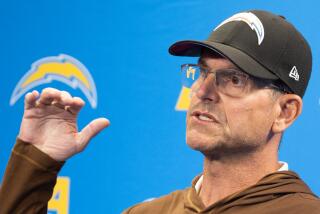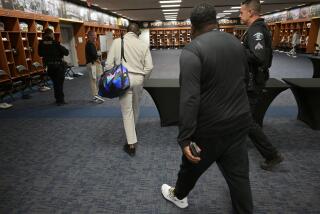Florida State Might Be Facing NCAA Penalties : College football: Seminoles admit that at least two players accepted gifts from agent recruiters.
- Share via
In an admission that could conceivably lead to an NCAA investigation and, in a worst-case scenario, the forfeiture of games and perhaps the loss of its 1993 national championship, Florida State officials said Saturday that at least two Seminole players accepted illegal gifts from sports agent recruiters.
According to Florida State President Talbot (Sandy) D’Alemberte, school authorities launched an in-house investigation of the alleged improprieties after being confronted last Thursday with information uncovered by two Sports Illustrated reporters. Since then, according to a statement issued by the university Saturday, “we were able to determine that two members of the team received a gift of clothing on one occasion from a recruiter for an out-of-state, unregistered sports agent.”
The statement also said that one of the players (Florida State declined to disclose names) also admitted receiving $40 last fall from one of the recruiters.
Meanwhile, the Tallahassee Democrat reported in its Saturday editions that a prospective agent allegedly spent as much as $6,000 on several Florida State players at a local mall.
“We have learned there were indeed some problems we need to address,” said D’Alemberte, who formerly served as president of the American Bar Assn. “We’ve only begun the investigation. There are a great deal of things we don’t know.”
In response to the allegations, Florida State has informed both the NCAA and the Atlantic Coast Conference of its inquiry and also has retained the Overland Park, Kan., sports law firm Bond, Schoeneck & King to oversee the school’s investigation. The firm, which is based in the same Kansas City suburb as the NCAA headquarters, is well known in intercollegiate circles and has represented an assortment of universities in NCAA infractions cases.
D’Alemberte also said that quarterback Charlie Ward, the school’s Heisman Trophy winner, was not a target of the inquiry. In addition, none of the allegations reportedly involved coaches or alumni.
This is an important distinction. According to Rich Hilliard, NCAA director of enforcement, a school could be held accountable for the infractions if it had knowledge or should have had knowledge of the wrongdoing.
For example, if, as Florida State officials are insisting, the university was completely unaware of the illegal gifts, the Seminole program probably would not be penalized by the NCAA.
But, Hilliard said, if a university simply looked the other way or failed to pursue legitimate tips concerning such payoffs, “then institutional responsibility will kick in.” That could mean players being ruled ineligible, the forfeiture of games and, in Florida State’s case, an asterisk placed permanently next to the Seminoles’ 1993 season that saw the team go 12-1 and win a national championship.
“This is something you’re so afraid is going to happen any day,” Florida State Coach Bobby Bowden said at a Saturday news conference. “It’s a time bomb sitting out there ticking, ticking, ticking and you hope that big old hand doesn’t hit on our number. . . . It’s embarrassing, but this too shall pass.”
The school seemingly has several factors in its favor. Florida State officials are quick to point out that its players are required twice a year to sign an oath that says they have accepted no extra benefits or violated NCAA rules.
Then there is a matter of history. The football program, which has never been on probation during Bowden’s 19-year stay in Tallahassee, is generally regarded as honest, forthright and vigilant. In regards to monitoring its players, David Thompson, ACC assistant commissioner of compliance, told the Associated Press: “It seems to me (Florida State) has done everything it ought to have done.”
More to Read
Go beyond the scoreboard
Get the latest on L.A.'s teams in the daily Sports Report newsletter.
You may occasionally receive promotional content from the Los Angeles Times.









